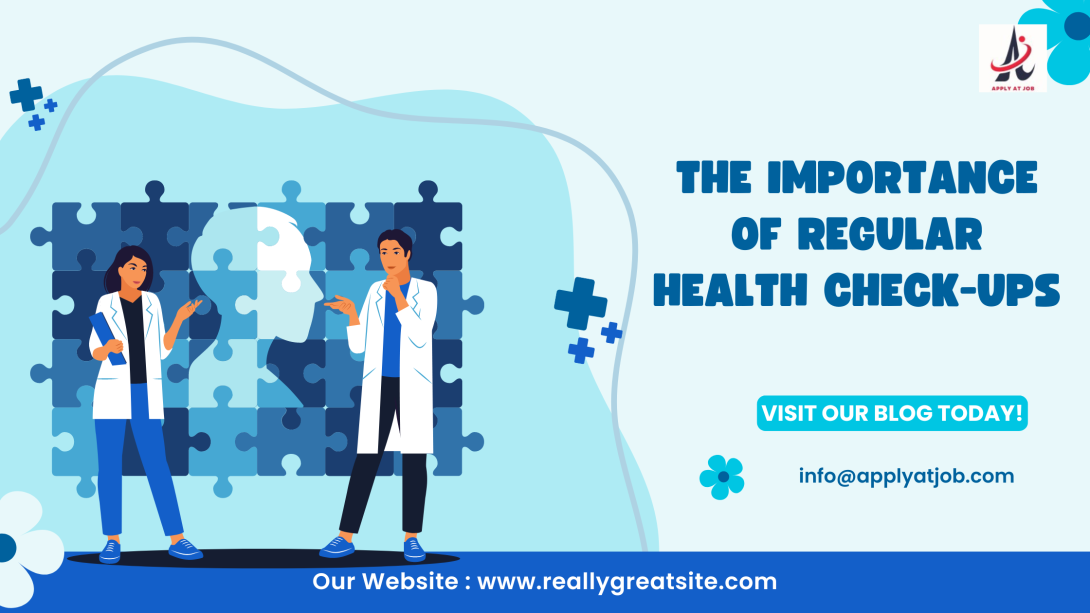
The Value of Continual Medical Examinations:
It's easy to forget about our health in the fast-paced world of today. Due to personal commitments, family obligations, and professional pressures, health frequently suffers until a major issue develops. However, in many circumstances, waiting for symptoms to manifest before visiting a doctor might be too late. Maintaining long-term health and averting potential health problems need routine medical exams.
Why Is It Important to Get Regular Checkups?
1.It's Better to Prevent Than to Treat:
The primary goal of routine examinations is to identify possible health issues before they worsen. Many illnesses, including diabetes, heart disease, and some malignancies, can progress silently in the early stages and show no symptoms at all. You may identify these problems early, when treatment is more likely to be successful and less intrusive, by seeing a healthcare professional on a regular basis.
2.Observing Current Situations:
To properly treat chronic diseases such as diabetes, asthma, or hypertension, people must see their doctor on a regular basis. Regular checkups help guarantee that drugs are taken as prescribed, therapies are having the desired effect, and lifestyle modifications are improving your health. Timely action can avert problems by allowing for the early discovery of any deteriorating disease.
3.Creating a Health Reference Point:
Frequent examinations enable you and your physician to create a baseline for your health. Weight, blood pressure, cholesterol, and other critical metrics are monitored over time to give you a better idea of what is typical for your body. This can assist in spotting even little changes that can eventually point to a more serious health problem.
4.Developing a Bond with Your Medical Professional:
It is vital to have a doctor you trust and who is aware of your medical history. Regular check-ups help you and your healthcare provider develop a connection that makes more individualized treatment possible. They are more likely to identify any irregularities or trends in your health over time and offer guidance specific to your requirements.
Important Elements of a Routine Health Examination:
Typically, a thorough health examination consists of the following:
. Physical Examination: Your physician will examine your heart, lungs, belly, skin, and other body parts to see how well you are physically overall. They could also examine your hearing and eyesight.
. Blood Tests: Blood tests are frequently performed to measure blood sugar, cholesterol, and other health-related parameters. These tests can identify early signs of illnesses including diabetes, heart disease, or anemia.
. Check Your Blood Pressure: Since high blood pressure poses a significant risk for heart disease and stroke, it is imperative that you keep an eye on your readings.
. Body Mass Index (BMI): Your BMI will be determined by measuring your height and weight. A high body mass index (BMI) might raise your risk of heart disease and diabetes, among other health issues.
. Screening Tests: Your doctor may suggest additional screening tests, such as mammograms, colonoscopies, or prostate examinations, according on your age, gender, and risk factors. For the early diagnosis of cancer and other disorders, these examinations are essential.
. Immunizations and vaccines: It's a good idea to make sure you get all of your recommended vaccines, including the shingles, tetanus, and flu shots, at routine check-ups.
Age-Related Health Examinations:
The kinds of examinations and screenings we require alter as we get older. What to anticipate at various life phases is as follows:
. In your twenties and thirties: Give priority to developing healthy habits and preventative care. It is advised to have routine physical examinations, cholesterol testing, and blood pressure checks.
. In your 40s and 50s: It becomes increasingly crucial to have screening tests for chronic illnesses like diabetes and heart disease as well as cancers like breast and colon cancer. For women, a bone density screening may also be advised.
. In your 60s and beyond: It's essential to get regular tests for cancer, diabetes, and heart disease. Tests for hearing and vision as well as bone density are becoming increasingly widespread. Assessing cognitive wellness is another option.
Examinations for Mental Health:
There are other reasons to schedule routine check-ups than physical health. The state of one's mind greatly affects their general wellbeing. Stress, anxiety, and depression are prevalent problems that frequently remain unidentified. During routine check-ups, you can talk to your doctor about any emotional or psychological issues you may be having, and they can propose suitable therapies or treatments.
Overcoming Obstacles to Frequent Exams:
Frequent health check-ups are vital, yet many individuals put off getting them because they feel well, are afraid of the expense, or both. On the other hand, skipping preventative care might lead to later medical costs and more intrusive procedures. Here's how to get through these obstacles:
. Cost: Routine health exams are frequently covered by insurance plans, and public health campaigns frequently offer free or inexpensive screenings.
. Fear: Share your worries with your physician so they can allay your fears and walk you through the process.
. Busy Schedule: Make your health a priority by planning ahead for checkups and handling them like you would any other essential appointment.
Conclusion:
Getting regular checkups is an investment in your well-being. They provide a proactive approach to health management, assisting in the avoidance of illnesses, the early detection of disorders, and the maintenance of general wellbeing. It's simple to put off these visits due to hectic schedules and a mountain of obligations, but taking care of your health should come first. You may take a big step toward living a longer, healthier life by making frequent appointments to your healthcare professional.
You can visit our website: Applyatjob
https://applyatjob.com/jobs
https://applyatjob.com/hiring-employee




